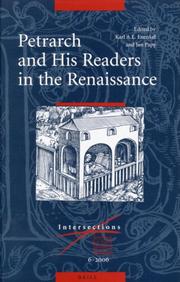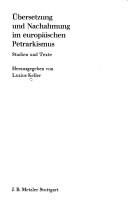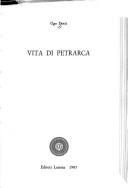| Listing 1 - 10 of 14 | << page >> |
Sort by
|
Book
ISBN: 9783825359508 Year: 2012 Publisher: Heidelberg Universitätsverlag Winter
Abstract | Keywords | Export | Availability | Bookmark
 Loading...
Loading...Choose an application
- Reference Manager
- EndNote
- RefWorks (Direct export to RefWorks)
Petrarca, Francesco --- Italian literature --- History and criticism --- Petrarca, Francesco, --- Pétrarque --- Petrarch --- Petracco, Francesco --- Petrarca, Francesco (1304-1374) --- Criticism and interpretation. --- Petrarca, Franciscus, --- Petrarch, --- Petrarch, Francesco, --- Petrarcha, Franciscus, --- Petrark, --- Petrarka, Franchesko, --- Peṭrarḳa, Frants'esḳo, --- Pétrarque, --- Петрарка, Франческо, --- פטררקא, פרנצ׳סקו

ISBN: 9004147667 9789004147669 9047408500 1435614658 Year: 2006 Volume: 6 Publisher: [Place of publication not identified] Brill
Abstract | Keywords | Export | Availability | Bookmark
 Loading...
Loading...Choose an application
- Reference Manager
- EndNote
- RefWorks (Direct export to RefWorks)
Petrarca, Francesco --- Petrarca, Francesco, --- Criticism and interpretation --- Academic collection --- Pétrarque --- Petrarch --- Petracco, Francesco --- Petrarca, Francesco (1304-1374) --- Criticism and interpretation. --- Appreciation --- History --- 16th century --- Petrarca, Franciscus, --- Petrarch, --- Petrarch, Francesco, --- Petrarcha, Franciscus, --- Petrark, --- Petrarka, Franchesko, --- Peṭrarḳa, Frants'esḳo, --- Pétrarque, --- Петрарка, Франческо, --- פטררקא, פרנצ׳סקו --- Petrarca, Francesco, - 1304-1374 - Criticism and interpretation --- Romance Literatures --- Languages & Literatures --- Italian Literature --- Petrarca, Francesco, - 1304-1374
Book
ISBN: 9780521185042 0521185041 9781107006140 1107006147 1316409724 0511795009 1316408663 9780511795008 9781316408667 9781316409725 Year: 2015 Publisher: Cambridge Cambridge University Press
Abstract | Keywords | Export | Availability | Bookmark
 Loading...
Loading...Choose an application
- Reference Manager
- EndNote
- RefWorks (Direct export to RefWorks)
Petrarch (Francesco Petrarca, 1304–74), best known for his influential collection of Italian lyric poetry dedicated to his beloved Laura, was also a remarkable classical scholar, a deeply religious thinker and a philosopher of secular ethics. In this wide-ranging study, chapters by leading scholars view Petrarch's life through his works, from the epic Africa to the Letter to Posterity, from the Canzoniere to the vernacular epic Triumphi. Petrarch is revealed as the heir to the converging influences of classical cultural and medieval Christianity, but also to his great vernacular precursor, Dante, and his friend, collaborator and sly critic, Boccaccio. Particular attention is given to Petrach's profound influence on the Humanist movement and on the courtly cult of vernacular love poetry, while raising important questions as to the validity of the distinction between medieval and modern and what is lost in attempting to classify this elusive figure.
Petrarca, Francesco, --- Petrarca, Franciscus, --- Petrarch, --- Petrarch, Francesco, --- Petrarcha, Franciscus, --- Petrark, --- Petrarka, Franchesko, --- Peṭrarḳa, Frants'esḳo, --- Pétrarque, --- Петрарка, Франческо, --- פטררקא, פרנצ׳סקו --- Criticism and interpretation. --- Pétrarque --- Petrarch --- Petracco, Francesco --- Petrarca, Francesco (1304-1374) --- Petrarca, Francesco --- Pétrarque, Francesco, --- Pétrarque, Francesco, 1304-1374
Book
ISBN: 9780521114677 0521114675 9780511730337 9781107689596 9780511729812 0511729812 9780511726521 051172652X 9780511727917 0511727917 0511730330 1107689597 1107203007 1282619969 9786612619960 0511728867 0511725108 Year: 2010 Publisher: Cambridge Cambridge University Press
Abstract | Keywords | Export | Availability | Bookmark
 Loading...
Loading...Choose an application
- Reference Manager
- EndNote
- RefWorks (Direct export to RefWorks)
Petrarch was one of the founding fathers of Renaissance humanism, yet the nature and significance of his ideas are still widely debated. In this book, Gur Zak examines two central issues in Petrarch's works - his humanist philosophy and his concept of the self. Zak argues that both are defined by Petrarch's idea of care for the self. Overcome by a strong sense of fragmentation, Petrarch turned to the ancient idea that philosophy can bring harmony and wholeness to the soul through the use of spiritual exercises in the form of writing. Examining his vernacular poetry and his Latin works from both literary and historical perspectives, Zak explores Petrarch's attempts to use writing as a spiritual exercise, how his spiritual techniques absorbed and transformed ancient and medieval traditions of writing, and the tensions that arose from his efforts to care for the self through writing.
Petrarca, Francesco --- Humanism in literature. --- Self in literature. --- Humanists --- Petrarca, Francesco, --- Criticism and interpretation. --- Philosophy. --- Humanism in literature --- Self in literature --- Pétrarque --- Petrarch --- Petracco, Francesco --- Petrarca, Francesco (1304-1374) --- Petrarca, Franciscus, --- Petrarch, --- Petrarch, Francesco, --- Petrarcha, Franciscus, --- Petrark, --- Petrarka, Franchesko, --- Peṭrarḳa, Frants'esḳo, --- Pétrarque, --- Петрарка, Франческо, --- פטררקא, פרנצ׳סקו --- Arts and Humanities --- History --- Pétrarque (1304-1374) --- Humanisme --- Soi --- Critique et interprétation --- Dans la littérature

ISBN: 3476002969 9783476002969 Year: 1974 Volume: 7 Publisher: Stuttgart : Metzler,
Abstract | Keywords | Export | Availability | Bookmark
 Loading...
Loading...Choose an application
- Reference Manager
- EndNote
- RefWorks (Direct export to RefWorks)
Comparative literature --- Italian literature --- Petrarca, Francesco, --- Criticism and interpretation --- 82.03 --- Vertalen. Literaire vertaling --- 82.03 Vertalen. Literaire vertaling --- Pétrarque --- Petrarch --- Petracco, Francesco --- Petrarca, Francesco (1304-1374) --- Criticism and interpretation. --- Petrarca, Francesco --- Petrarca, Franciscus, --- Petrarch, --- Petrarch, Francesco, --- Petrarcha, Franciscus, --- Petrark, --- Petrarka, Franchesko, --- Peṭrarḳa, Frants'esḳo, --- Pétrarque, --- Петрарка, Франческо, --- פטררקא, פרנצ׳סקו --- Petrarca, Francesco, - 1304-1374 - Criticism and interpretation --- Petrarca, Francesco, - 1304-1374

ISBN: 8842028851 Year: 1987 Publisher: Roma Laterza
Abstract | Keywords | Export | Availability | Bookmark
 Loading...
Loading...Choose an application
- Reference Manager
- EndNote
- RefWorks (Direct export to RefWorks)
Petrarca, Francesco --- Authors, Italian --- Ecrivains italiens --- Biography --- Biographies --- Petrarca, Francesco, --- Biographie --- 850 "13" PETRARCA, FRANCESCO --- -Italian authors --- Italiaanse literatuur--?"13"--PETRARCA, FRANCESCO --- 850 "13" PETRARCA, FRANCESCO Italiaanse literatuur--?"13"--PETRARCA, FRANCESCO --- -Italiaanse literatuur--?"13"--PETRARCA, FRANCESCO --- Pétrarque --- Petrarch --- Petracco, Francesco --- Petrarca, Francesco (1304-1374) --- Biography. --- Petrarca, Franciscus, --- Petrarch, --- Petrarch, Francesco, --- Petrarcha, Franciscus, --- Petrark, --- Petrarka, Franchesko, --- Peṭrarḳa, Frants'esḳo, --- Pétrarque, --- Петрарка, Франческо, --- פטררקא, פרנצ׳סקו
Book
ISBN: 9782503516523 2503516521 Year: 2011 Volume: [4] Publisher: Turnhout: Brepols,
Abstract | Keywords | Export | Availability | Bookmark
 Loading...
Loading...Choose an application
- Reference Manager
- EndNote
- RefWorks (Direct export to RefWorks)
La bibliothèque de Pétrarque ne se réduit pas aux manuscrits-pourtant nombreux-qui ont appartenu au grand poète et humaniste toscan du XIVe siècle. Idéalement, elle englobe tous les auteurs qu'il a lus et médités-qu'il se réclame ouvertement d'eux ou qu'il passe leur nom sous silence-et s'étend même aux écrivains et aux artistes qui, aux siècles suivants, l'ont lu et se sont inspirés de lui. C'est à cette bibliothèque idéale de Pétrarque que le présent receuil est consacré. Il rassemble dix-sept études portant sur quelques-uns des grands auteurs qui la constituent, depuis Horace, Tite-Live, Pomponius Mela, saint Jérôme, Claudien ou Macrobe jusqu'à Machiavel ou Maerten van Heemskerck en passant par saint Bernard, Jean de Salisbury, Guillaume de Lorris ou Dante. Ces études ont été écrites par les chercheurs de nationalités diverses-jeunes ou confirmés-qui se sont réunis du 27 au 29 novembre 2003 à Tours, au Centre d'Études Supérieures de la Renaissance, pour célébrer le septième centenaire de la naissance de Pétrarque (1304). Le Centre d'Études Supérieures de la Renaissance a en effet pour vocation d'étudier une Renaissance qui va. Il se devait donc de prendre toute sa part dans les diverses manifestations internationales qui ont marqué cet anniversaire.
Petrarca, Francesco, --- Books and reading --- Petrarca, Francesco --- 091 <017.2 PETRARCA, FRANCESCO> --- Handschriftenkunde. Handschriftencatalogi--Private verzamelingen--PETRARCA, FRANCESCO --- 091 <017.2 PETRARCA, FRANCESCO> Handschriftenkunde. Handschriftencatalogi--Private verzamelingen--PETRARCA, FRANCESCO --- Pétrarque --- Petrarch --- Petracco, Francesco --- Petrarca, Francesco (1304-1374) --- Conferences - Meetings --- Comparative literature --- Library --- Congresses --- Humanists --- Italy --- 14th century --- Petrarca, Franciscus, --- Petrarch, --- Petrarch, Francesco, --- Petrarcha, Franciscus, --- Petrark, --- Petrarka, Franchesko, --- Peṭrarḳa, Frants'esḳo, --- Pétrarque, --- Петрарка, Франческо, --- פטררקא, פרנצ׳סקו --- Petrarca, Francesco, - 1304-1374 - Books and reading - Congresses --- Petrarca, Francesco, - 1304-1374
Book
ISBN: 9781409441984 1409441989 Year: 2012 Volume: 1012 Publisher: Farnham ; Burlington, VT Ashgate
Abstract | Keywords | Export | Availability | Bookmark
 Loading...
Loading...Choose an application
- Reference Manager
- EndNote
- RefWorks (Direct export to RefWorks)
Renaissance --- humanism --- Petrarca, Francesco --- Alberti, Leon Battista --- Humanism --- Humanism in literature. --- Pétrarque, --- Alberti, Leon Battista, --- Petrarca, Francesco, --- Critique et interprétation --- Criticism and interpretation. --- Humanism in literature --- Pétrarque --- Petrarch --- Petracco, Francesco --- Petrarca, Francesco (1304-1374) --- Albert, Leon Baptiste --- Alberti, Leon Batista --- Alberti, Leo Baptista, --- Alberti, Leon Batista, --- Alberti, Leonis Baptiste, --- Alberti, Leone Battista, --- Alberti, L. B. --- Alberti, Battista, --- אלברטי, ליאון באטיסטה --- Lepidus, --- Critique et interprétation. --- Petrarca, Franciscus, --- Petrarch, --- Petrarch, Francesco, --- Petrarcha, Franciscus, --- Petrark, --- Petrarka, Franchesko, --- Peṭrarḳa, Frants'esḳo, --- Pétrarque, --- Петрарка, Франческо, --- פטררקא, פרנצ׳סקו --- Pétrarque --- Critique et interprétation.
Multi
ISBN: 9781107110281 9781316275023 9781107526990 1107110289 1316357597 1316361993 1316355594 1316363996 1316364992 110752699X 131636299X 1316275027 1316358593 1316349594 Year: 2015 Publisher: Cambridge Cambridge University Press
Abstract | Keywords | Export | Availability | Bookmark
 Loading...
Loading...Choose an application
- Reference Manager
- EndNote
- RefWorks (Direct export to RefWorks)
Moving from a definition of the lyric to the innovations introduced by Petrarch's poetic language, this study goes on to propose a new reading of several French poets (Charles d'Orléans, Ronsard, and Du Bellay), and a re-evaluation of Montaigne's understanding of the most striking poetry and its relation to his own prose. Instead of relying on conventional notions of Renaissance subjectivity, it locates recurring features of this poetic language that express a turn to the singular and that herald lyric poetry's modern emphasis on the utterly particular. By combining close textual analysis with more modern ethical concerns this study establishes clear distinctions between what poets do and what rhetoric and poetics say they do. It shows how the tradition of rhetorical commentary is insufficient in accounting for this startling effectiveness of lyric poetry, manifest in Petrarch's Rime Sparse and the collections of the best poets writing after him.
Poetry --- French literature --- anno 1500-1599 --- French poetry --- Lyric poetry --- Particularity (Aesthetics) --- History and criticism. --- History and criticism --- Theory, etc. --- Montaigne, Michel de, --- Petrarca, Francesco, --- Criticism and interpretation. --- Language. --- Particularity (Aesthetics). --- Aesthetics --- History and criticism&delete& --- Theory, etc --- Pétrarque --- Petrarch --- Petracco, Francesco --- Petrarca, Francesco (1304-1374) --- Montagne, Michel de, --- Montenʹ, Mishelʹ, --- Montanʹe, Mikhaĭlo, --- Montaigne, Michel Eyquem de, --- Montaigne, --- Montēnyu, --- Montaini, Misel d̲e, --- דה־מונטן, מישל, --- די־מונטין, מיכאל, --- מונטין, מישל דה, --- Montenj, Mišel de, --- Petrarca, Franciscus, --- Petrarch, --- Petrarch, Francesco, --- Petrarcha, Franciscus, --- Petrark, --- Petrarka, Franchesko, --- Peṭrarḳa, Frants'esḳo, --- Pétrarque, --- Петрарка, Франческо, --- פטררקא, פרנצ׳סקו --- de Montaigne, Michel Eyquem --- Eyquem, Michel --- Monten', Mišel' --- Petrarca, Francesco
Book
ISBN: 0300023278 Year: 1979 Publisher: New Haven, Conn.
Abstract | Keywords | Export | Availability | Bookmark
 Loading...
Loading...Choose an application
- Reference Manager
- EndNote
- RefWorks (Direct export to RefWorks)
History of philosophy --- Petrarca, Francesco --- anno 1500-1599 --- Consciousness in literature --- Renaissance --- -850 "13" PETRARCA, FRANCESCO --- 87.085 --- 094:82-5 --- 873.4 <45> --- Revival of letters --- Civilization --- History, Modern --- Civilization, Medieval --- Civilization, Modern --- Humanism --- Middle Ages --- Italiaanse literatuur--?"13"--PETRARCA, FRANCESCO --- Klassieke literatuur: retorica --- Oude en merkwaardige drukken. Kostbare en zeldzame boeken. Preciosa en rariora-:-Retoriek. Redevoering --- Humanistisch Latijnse literatuur--Italië --- History --- -Petrarca, Francesco --- -Criticism and interpretation --- Philosophy --- 873.4 <45> Humanistisch Latijnse literatuur--Italië --- 094:82-5 Oude en merkwaardige drukken. Kostbare en zeldzame boeken. Preciosa en rariora-:-Retoriek. Redevoering --- 87.085 Klassieke literatuur: retorica --- 850 "13" PETRARCA, FRANCESCO Italiaanse literatuur--?"13"--PETRARCA, FRANCESCO --- 850 "13" PETRARCA, FRANCESCO --- Pétrarque --- Petrarch --- Petracco, Francesco --- Petrarca, Francesco (1304-1374) --- Criticism and interpretation. --- Philosophy. --- Petrarca, Franciscus, --- Petrarch, --- Petrarch, Francesco, --- Petrarcha, Franciscus, --- Petrark, --- Petrarka, Franchesko, --- Peṭrarḳa, Frants'esḳo, --- Pétrarque, --- Петрарка, Франческо, --- פטררקא, פרנצ׳סקו
| Listing 1 - 10 of 14 | << page >> |
Sort by
|

 Search
Search Feedback
Feedback About UniCat
About UniCat  Help
Help News
News